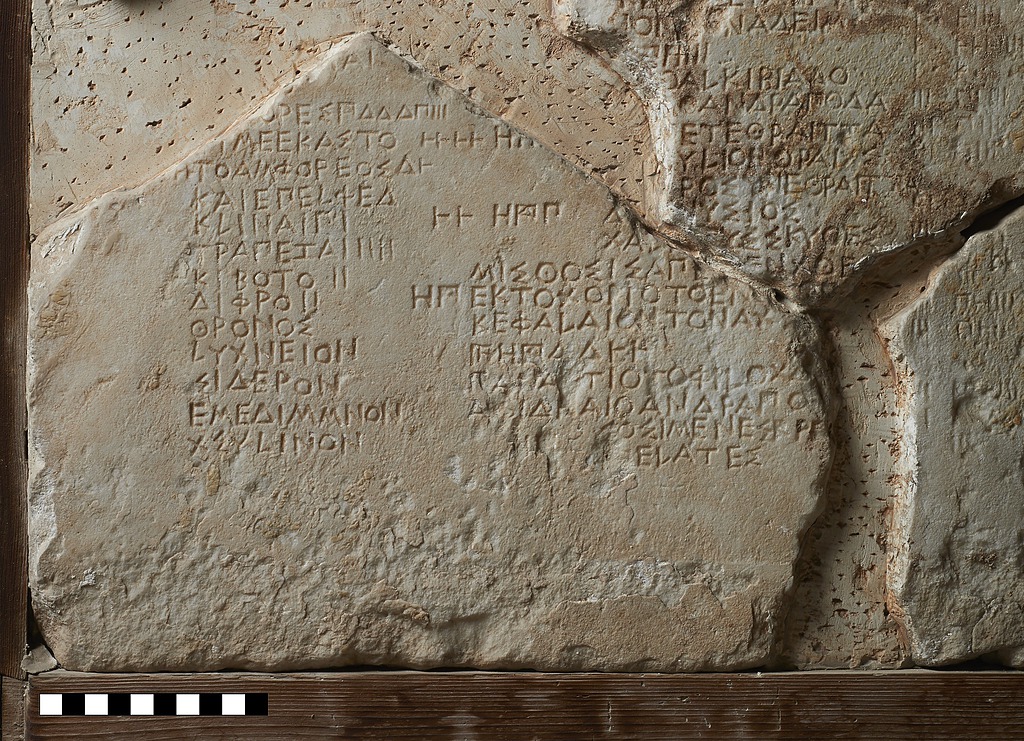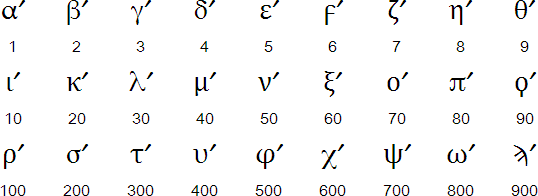33

Adverbs
Adverbs in Greek function much as they do in English; namely, they provide additional information about a verb, adjective, or other adverb. Most often, they indicate manner, time, intensity, quantity, or place. In this lesson, we discuss adverbs that are formed from adjectives.
Formation
The most common ending for an adverb is –ως. This ending corresponds almost exactly to the –ly ending in English. Adverbs do not decline.
To form this type of adverb, start with the MASCULINE GENITIVE PLURAL of the ADJECTIVE and substitute –ς for the final –ν (S 343). (Τhe adverb does not, in fact, derive from the genitive plural, but this method provides a convenient way to determine the form of the adverb.) The ACCENT remains as it was on the genitive plural.
For example:
| Adjective | Genitive Plural | Adverb |
| ἀληθής ἀληθές | ἀληθῶν | ἀληθῶς |
| ἡδύς ἡδεῖα ἡδύ | ἡδέων | ἡδέως |
| κακός –ή –όν | κακῶν | κακῶς |
| ὅλος -η -ον | ὅλων | ὅλως |
Vocabulary
Greek adverbs derived from adjectives are not normally listed in a vocabulary or lexicon, since they form regularly and have predictable meanings. If an adverb has a more specialized meaning or distinct form, however, it is listed. Note, for example, the following common adverbs:
- ἄλλως otherwise
- ἅπλως singly, in one way, simply
- ἴσως equally, probably, perhaps
- ὅμως likewise, equally
- οὕτω/οὕτως in this way, thus
- πάντως altogether, in all ways, at any rate
- πάνυ altogether, entirely, certainly
- τὸ πρῶτον first
- πῶς in what way? how?
- πως (enclitic) in any way
- ὕστερον afterwards
- ὧδε thus, in this way; here
- ὡς as
- ὥσπερ just as, as if
Numbers
Cardinal Numbers
Ancient Greek normally writes out cardinal numbers. The numbers one, two, three and four decline, most in the 3rd declension. The numbers from 5 to 199 do not decline.
- εἷς, μία, ἕν one
- δύο two
- τρεῖς, τρία three
- τέτταρες, τέτταρα four
We have already learned how to inflect the number one. To review:
εἷς μία ἕν one (S 349; GPH p. 37)
| M | F | N | |
| Nominative | εἷς | μία | ἕν |
| Genitive | ἑνός | μιᾶς | ἑνός |
| Dative | ἑνί | μιᾷ | ἑνί |
| Accusative | ἕνα | μίαν | ἕν |
δύο two (S 349; GPH p. 37)
| M/F/N | |
| Nominative | δύο |
| Genitive | δυοῖν |
| Dative | δυοῖν |
| Accusative | δύο |
τρεῖς, τρία three (S 349; GPH p. 38)
| M/F | N | |
| Nominative | τρεῖς | τρία |
| Genitive | τριῶν | τριῶν |
| Dative | τρισί | τρισί |
| Accusative | τρεῖς | τρία |
τέτταρες, τέτταρα four (S 349; GPH p. 38)
| M/F | N | |
| Nominative | τέτταρες | τέτταρα |
| Genitive | τεττάρων | τεττάρων |
| Dative | τέτταρσι | τέτταρσι |
| Accusative | τέτταρας | τέτταρα |
The cardinal numbers 5-29 (S 347)
| five: πέντε | fourteen: τέτταρες καὶ δέκα |
| six: ἕξ | fifteen: πεντεκαίδεκα |
| seven: ἑπτά | sixteen: ἑκκαίδεκα |
| eight: ὀκτώ | seventeen: ἑπτακαίδεκα |
| nine: ἐννέα | eighteen: ὀκτωκαίδεκα |
| ten: δέκα | nineteen: ἐννεακαίδεκα |
| eleven: ἕνδεκα | twenty: εἴκοσι |
| twelve: δώδεκα | twenty one: εἷς καὶ εἴκοσι |
| thirteen: τρεῖς καὶ δέκα | twenty two: δύο καὶ εἴκοσι κτλ |
– κοντα indicates the tens (-ty)
| thirty: τριάκοντα | seventy: ἑβδομήκοντα |
| forty: τετταράκοντα | eighty: ὀγδοήκοντα |
| fifty: πεντήκοντα | ninety: ἐνενήκοντα |
| sixty: ἑξήκοντα | one hundred: ἑκατόν |
– κόσιοι indicates the hundreds. Note that the numbers two hundred and higher decline as 1st and 2nd declension adjectives.
| two hundred: διακόσιοι –αι –α | thousand: χίλιοι –αι –α |
| three hundred: τριακόσιοι –αι –α | two thousand: δισχίλιοι –αι –α |
| four hundred: τετρακόσιοι –αι –α | three thousand: τρισχίλιοι –αι –α |
| five hundred: πεντακόσιοι –αι –α | ten thousand: μύριοι –αι –α |
| six hundred: ἑξακόσιοι –αι –α | twenty thousand: δισμύριοι –αι –α |
| seven hundred: ἑπτακόσιοι –αι –α | = δύο μυριάδες |
| eight hundred: ὀκτακόσιοι –αι –α | hundred thousand: δεκακισμύριοι –αι –α |
| nine hundred: ἐνακόσιοι –αι –α | hundred million: μυριάκις μύριοι –αι –α |
Greek usually expresses written compound numbers above 20 (21, 22…) in one of two ways:
- placing the smaller number first, followed by καί and the larger number
- εἷς καὶ εἴκοσι
- placing the larger number first, followed by the smaller number. In this order, καί is optional.
- εἴκοσι καὶ εἷς
- εἴκοσι εἷς
Numeral Notation
In the Classical period, inscriptions show the following numerals. This system is called ACROPHONIC, i.e., some of the numbers are represented by the first letter of the word for that number (S 348A). Note, for example, a version of the Π = πέντε; Δ = δέκα; Η =ἑκατόν (Η in an earlier alphabet was the letter representing a rough breathing, and so was the first letter of the older form hεκατόν); Χ = χίλιοι; and Μ = μύριοι.
Note also the compound signs. In these cases, multiply the numbers that comprise the compound.
After the 2nd c. B.C., ALPHABETIC NUMERALS replace the acrophonic system (S 347).

Ordinal Numbers
Ancient Greek normally writes out ordinal numbers. Note that ordinals decline as regular 1st and 2nd declension adjectives (S 347).
| first: πρῶτος –η –ον | twelfth: δωδέκατος –η –ον |
| second: δεύτερος –α –ον | thirteenth: τρίτος καὶ δέκατος κτλ |
| third: τρίτος –η –ον | twentieth: εἰκοστός –ή –όν |
| fourth: τέταρτος –η –ον | thirtieth: τριακοστός –ή –όν |
| fifth: πέμπτος –η –ον | fortieth: τετταρακοστός –ή –όν |
| sixth: ἕκτος –η –ον | fiftieth: πεντηκοστός –ή –όν |
| seventh: ἕβδομος –η –ον | sixtieth: ἑξηκοστός –ή –όν |
| eighth: ὄγδοος –η –ον | seventieth: ἑβδομηκοστός –ή –όν |
| ninth: ἔνατος –η –ον | eightieth: ὀγδοηκοστός –ή –όν |
| tenth: δέκατος –η –ον | ninetieth: ἐνενηκοστός –ή –όν |
| eleventh: ἐνδέκατος –η –ον | hundredth: ἑκατοστός –ή –όν |
Number Adverbs
With the exception of ἅπαξ once, δίς twice, and τρίς thrice, Greek normally adds –κις to a cardinal number to make numeral adverbs (S 347).
For example:
- ἅπαξ once
- δίς twice
- τρίς thrice, three times
- τετράκις four times
- πεντάκις five times
- ἑξάκις six times
- δεκάκις ten times
With number adverbs in hand, now we can do some math!
- ἑκκαίδεκα καὶ τέτταρά εἰσιν εἴκοσι
- sixteen plus (and) four equals (are) twenty
- τὰ πεντάκις δέκα ἐστὶ πεντήκοντα
- five times ten (or: ten five times) equals (is) fifty
– τὸ τέλος –
Paradigms, Key Terms and Concepts
- Chapter Paradigms
- ADVERBS FORMED FROM ADJECTIVES
- CARDINAL NUMBERS
- ACROPHONIC NUMERALS
- ALPHABETIC NUMERALS
- ORDINAL NUMBERS
- NUMBER ADVERBS
Vocabulary List 1
Adverbs
- ἄλλως otherwise
- ἅπλως singly, in one way, simply
- ἴσως equally, probably, perhaps
- ὅμως likewise, equally
- οὕτω/οὕτως in this way, thus
- πάντως altogether, in all ways, at any rate
- πάνυ altogether, entirely, certainly
- τὸ πρῶτον first
- πῶς in what way? how?
- πως (enclitic) in any way
- ὕστερον afterwards
- ὧδε thus, in this way; here
- ὡς as
- ὥσπερ just as, as if
- ἅπαξ once
- δίς twice
- τρίς thrice
Vocabulary List 2
Cardinal Numbers
- εἷς μία ἕν one
- δύο two
- τρεῖς τρία three
- τέτταρες τέτταρα four
- πέντε five
- ἕξ six
- ἑπτά seven
- ὀκτώ eight
- ἐννέα nine
- δέκα ten
- εἴκοσι twenty
- τριάκοντα thirty
- ἑκατόν one hundred
- μύριοι –αι –α ten thousand
- μυρίος -α -ον countless
- μυριάς -άδος ἡ ten thousand, countless
Ordinal Numbers
- πρῶτος –η –ον first
- δεύτερος –α –ον second
- τρίτος –η –ον third
- τέταρτος –η –ον fourth
- πέμπτος –η –ον fifth
- ἕκτος –η –ον sixth
- ἕβδομος –η –ον seventh
- ὄγδοος –η –ον eighth
- ἔνατος –η –ον ninth
- δέκατος –η –ον tenth
- εἰκοστός –ή –όν twentieth
- τριακοστός –ή –όν thirtieth
- ἑκατοστός –ή –όν hundredth
Exercises
Ι. Decline in all cases and numbers the following cardinal numbers.
- εἷς μία ἕν
- δύο
- τρεῖς τρία
- τέτταρες τέτταρα
ΙΙ. Supply, in Greek, the answers to the following math problems:
e.g.: ἑκκαίδεκα καὶ τέτταρά εἰσιν εἴκοσι = sixteen plus (and) four equals (are) twenty
- τρεῖς καὶ ἕξ εἰσι ________________
- δέκα καὶ δέκα εἰσὶ ________________
- ἕνδεκα καὶ δώδεκά εἰσι ________________
- τὰ ἑξάκις πέντε ἐστὶ ________________
- τὰ δεκάκις ἑκατόν ἐστι ________________
- τὰ πεντάκις _______________ ἐστι τετταράκοντα
- δὶς _______________ ἢ τρὶς _______________ ἢ τετράκις ______________ ἢ ἑξάκις _______________ ἐστὶ τὰ δώδεκα
Readings
κατὰ Λουκᾶν 12:49-56: AGE Ch. 33a.
IG i3 421, a sale of slaves: AGE Ch. 33b. (For a photo of this inscription, click here.)

